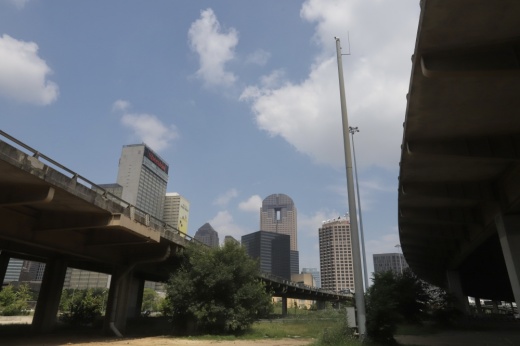The approval comes despite several community members speaking in opposition of TxDOT’s recommendation and urging City Council to study other alternatives. Now that the proposal has been greenlit, TxDOT can begin designing the plan, commonly known as the hybrid option, which would tear down the freeway and rebuild it mostly in a trench.
The overview: I-345, a 1.4-mile, elevated six-lane freeway, connects I-45 to US 75 through downtown Dallas and provides connections to I-30 and Woodall Rodgers Freeway. The freeway supports 180,000 vehicles per day, according to a $7 million feasibility study conducted by TxDOT from 2018-22.
A long time coming: TxDOT officials have said the freeway will eventually become too expensive to maintain as it is, and state and city officials have been discussing how to reconfigure the freeway since at least 2012. Critics of the freeway have suggested that tearing down the highway and replacing it with a boulevard system could reconnect Deep Ellum and southern Dallas to the downtown core. Built in 1973, the highway segregated Deep Ellum, which is historically Black, from other areas of the city, critics of the plan have argued.
Dallas City Council was previously scheduled to vote on whether to approve TxDOT’s hybrid proposal in February, but the vote got pushed back due to a lack of consensus.
Notable quote: “We all agree that the existing highway must come down in the future, so it is critical that we address this issue now so there is time to properly study it and engineer an appropriate replacement,” said District 14 Council Member Paul Ridley, who represents parts of East Dallas and Uptown.
The conditions: City Council’s vote of support May 24 included several conditions, including that TxDOT brief City Council on the agency’s progress in designing the project once every six months. Council also decided that TxDOT must incorporate certain city policies and strategies, such as the racial equity plan and economic development policy, when designing the project.
In addition, council directed City Manager T.C. Broadnax to investigate whether Dallas would be able to secure federal funding to pay for an independent study to explore alternative options to TxDOT’s hybrid recommendation. During the meeting, Broadnax said the study could cost up to $2 million.
Another condition of approval was that City Council may withdraw its support of the hybrid option in the future if the potential study finds better options or other funding is procured.
Also of note: If City Council were to withdraw its support of the hybrid option, TxDOT would seek reimbursement for its work on designing the project, said Ceason Clemens, Dallas district engineer for TxDOT, during the May 24 City Council meeting. Clemens said the next phase of the project, which includes an environmental analysis, is expected to cost the agency about $20 million. That step could take two years, and construction could start in 2028.





